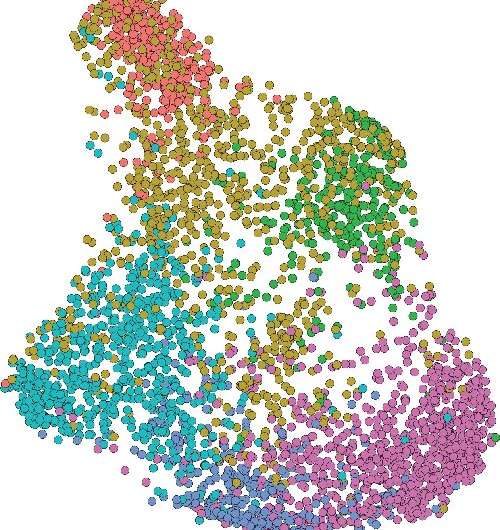
A investigate group led by the National Cancer Centre Singapore (NCCS) with customers from Duke-NUS Clinical University, KK Females and Kid’s Clinic, A*STAR’s Singapore Immunology Community (Sign), the University of Southampton and the Alan Turing Institute, has uncovered how most cancers evades the immune program and metastasizes in the physique, and explores how to shut down this dangerous characteristic.
How most cancers cells escape detection and destruction by the immune method is not entirely recognized, with numerous functioning to better comprehend it around the previous several yrs. This latest discovery, released in Nature Communications, has implications for the progress of novel approaches for most cancers therapy.
The immune technique queries and destroys abnormal cells this kind of as most cancers cells. However, in some instances, cancer cells stay away from staying detected and killed by the immune process and are in a position to produce and unfold more conveniently. Metastasis, a procedure when most cancers cells break absent from the principal tumor and kind in other components of the entire body, helps make cancer tougher to deal with and outcomes in poorer prognosis.
For this explanation, the group made a decision to investigate early onset of metastasis which ordinarily happens when cancer cells are detected in lymph nodes in close proximity to the main tumor.
“Like an unethical employer that forces their staff members to perform continually, most cancers forces the immune cells to operate overtime and come to be exhausted, rendering them incapable of operating generally,” claimed Professor Gopal Iyer, senior creator of the study and Head and Senior Marketing consultant, Division of Head and Neck Surgery, Division of Surgical procedures and Surgical Oncology, Singapore Normal Medical center and NCCS.
“Utilizing a procedure to alleviate worry on immune cells, we located that immune cells have been equipped to kill most cancers cells additional correctly. Still, just like some staff members who are also burnt out to do the job adequately even with a bonus, some immune cells were noticed to remain fatigued even following procedure, which is how cancer may perhaps not be detected and efficiently ruined by the immune program.”
Uncovering cancer immune technique suppression: A 3-aspect investigation
As the basis of their investigation, the crew profiled major and metastatic lymph node tumors from 14 sufferers with head and neck squamous mobile cancers, utilizing one mobile RNA sequencing. They identified pre-metastatic cells in the key tumors with the potential to metastasize to the lymph nodes.
They also uncovered that a considerable proportion of CD8+ cells, a key part of the immune technique that searches and kills irregular cells such as most cancers, were being ‘exhausted’ and unable to conduct their protecting function. This occurred when the immune cells had been consistently exposed to cancer and not able to do away with it.
Following, the staff discovered and specific pathways that solely impacted cancer cells, immune cells, as nicely as pathways that cancer cells make the most of to negatively affect immune cells, and were capable to avert some cancer spread and rejuvenate immune cells. However, despite these promising outcomes, most cancers cells ongoing to exhibit their ability to escape immune surveillance.
Utilizing a mouse design, engrafted with pre-metastatic cancer cells, the group analyzed a subgroup of CD8+ T cells expressing Midkine (MDK) receptors. Just one group in the design was taken care of with anti-PD1, whilst the other was a management arm.
There was an increase in fatigued MDK-receptor expressing CD8+ T cells even following anti-PD1 treatment, suggesting that the MDK-signaling pathway instigates immune suppression that undoes the outcomes of anti-PD1 therapy. Taken jointly, the success implicate MDK-signaling as a pathway which pre-metastatic most cancers cells use to evade CD8-mediated immune surveillance. It also explains why some sufferers do not answer as effectively as other people to anti-PD1 therapy.
Acquiring alternatives to strengthen procedure results
“Our investigations indicate that we can use numerous pathways to effectively deal with cancer—by targeting cancer cells, the immune system and utilizing present therapies to counter immune system evasion by most cancers cells. We know we have to have an increased arsenal of weapons to use towards cancer and have to set it jointly to boost treatment method results,” stated Professor Iyer, who is also head of the Division of Healthcare Sciences at NCCS.
Along with exploiting the targets identified in their exploration, the crew programs to detect therapies that they can merge with anti-PD1 remedy to successfully counter CD8+ T cells expressing MDK-receptors.
Extra information and facts:
Hong Sheng Quah et al, Single cell assessment in head and neck most cancers reveals probable immune evasion mechanisms throughout early metastasis, Mother nature Communications (2023). DOI: 10.1038/s41467-023-37379-y
Presented by
SingHealth
Quotation:
How cancer evades immune program detection and spreads (2023, April 11)
retrieved 12 April 2023
from https://medicalxpress.com/information/2023-04-cancer-evades-immune.html
This document is subject matter to copyright. Aside from any reasonable working for the intent of personal research or investigation, no
aspect may possibly be reproduced without the need of the created permission. The written content is furnished for data purposes only.






